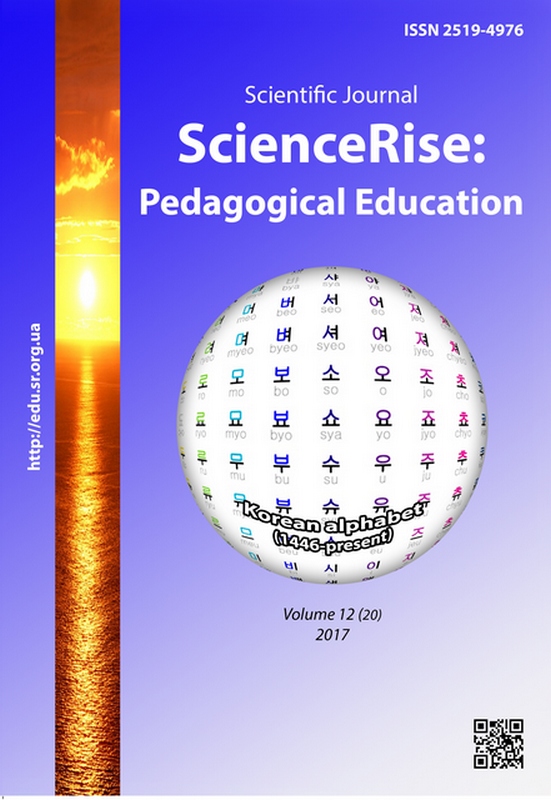Theoretical analysis of conceptual apparatus of post-graduate education of ecological specialists
DOI:
https://doi.org/10.15587/2519-4984.2017.120043Keywords:
post-graduate education, qualification improvement, self-education, probation, continuous ecological education, re-trainingAbstract
At the research there was realized the theoretical analysis of the notion “post-graduate education” in normative-legal and scientific-methodological sources. Interpretations of post-graduate education in law-making documents in the historical retrospective don’t essentially change, but great attention is paid to reforming and modernization of this system. There are separated structural elements of continuous ecological education by different approaches and ecological completeness of each subsystem was characterized. The system and subsystems of post-graduate education of ecological specialists were characterized. The detail analysis favors theoretical-methodological and scientific-practical studies of problems of professional training of ecological specialists including monitoring questions.
At the study there was proved the importance of self-education as the ability to self-improvement during the whole life for solving difficult ecological problems, faced by mankind. As a result of the theoretical analysis, there was determined a necessity to create educational programs within the system of post-graduate education, based on the competence approach for different categories of the managerial, controlling, production and pedagogical staff of the ecological directionReferences
- Desiatov, T. M. (2015). Intelektualni adaptyvni navchalni systemy doroslykh. Visnyk Cherkaskoho universytetu, 34 (367), 34–40.
- Protasova, N. H. (2013). Aktualni problemy teoriy i praktyky upravlinnia osvitoiu doroslykh v Ukraini. Osvita doroslykh: teoriya, dosvid, perspektyvy, 7, 149–159.
- Mysyk, I. H. (2011). Posledyplomnoe pedahohycheskoe obrazovanye v Ukrayne v systeme neprerivnoho obrazovanyia. Naukove piznannia: metodolohiya ta tekhnolohiya. Seriya: filosofiia, sotsiolohiya, politolohiya, 2 (27), 98–105.
- Kuleshova, V. V. (2011). Do problemy retrospektyvnoho analizu zarubizhnoho dosvidu funktsionuvannia systemy neperervnoi profesiinoi osvity. Problemy inzhenerno-pedahohichnoi osvity, 32-33, 184–191.
- Kliasen, N. (2014). Pisliadyplomna pedahohichna osvita: zarubizhnyi dosvid ta suchasna praktyka. Nova pedahohichna dumka, 2, 187–190. Available at: http://nbuv.gov.ua/UJRN/Npd_2014_2_56
- Oliinyk, V. V. (2013). Tendentsii rozvytku pisliadyplomnoi pedahohichnoi osvity v umovakh transformatsiy suspilstva. Teoriya i praktyka upravlinnia sotsialnymy systemamy, 1, 56–66.
- Ofitsiinyi sait Verkhovnoi Rady Ukrainy. Normatyvno-pravova baza Ukrainy. Available at: http://zakon3.rada.gov.ua/laws
- Pro osvitu (2017). Verkhovna Rada Ukrainy, No. 2145-VIII. Available at: http://zakon2.rada.gov.ua/laws/show/2145-19
- Kontseptsiya ekolohichnoi osvity Ukrainy (2002). Informatsiynyi zbirnyk Ministerstva osvity i nauky Ukrainy, 7, 3–23.
- Kremen, V. H. (Ed.) (2008). Entsyklopediya osvity. Kyiv: Yurinkom Inter, 1040.
Downloads
Published
How to Cite
Issue
Section
License
Copyright (c) 2017 Natalia Bordiug

This work is licensed under a Creative Commons Attribution 4.0 International License.
Our journal abides by the Creative Commons CC BY copyright rights and permissions for open access journals.
Authors, who are published in this journal, agree to the following conditions:
1. The authors reserve the right to authorship of the work and pass the first publication right of this work to the journal under the terms of a Creative Commons CC BY, which allows others to freely distribute the published research with the obligatory reference to the authors of the original work and the first publication of the work in this journal.
2. The authors have the right to conclude separate supplement agreements that relate to non-exclusive work distribution in the form in which it has been published by the journal (for example, to upload the work to the online storage of the journal or publish it as part of a monograph), provided that the reference to the first publication of the work in this journal is included.







